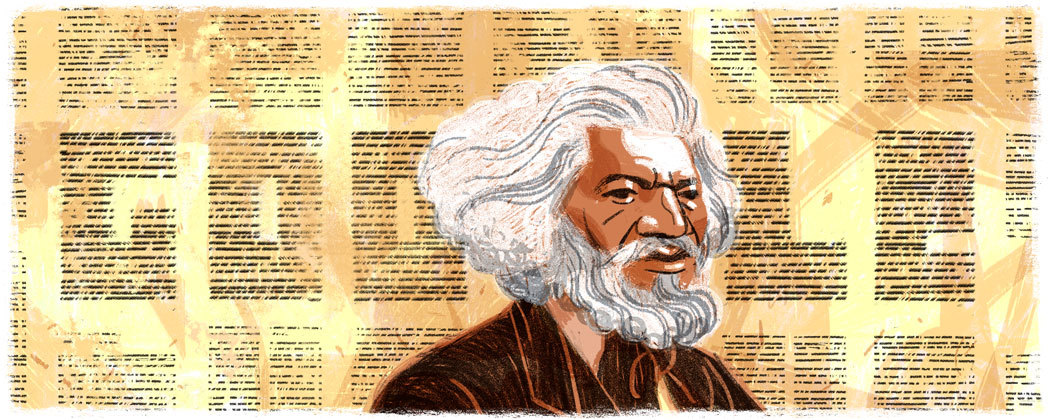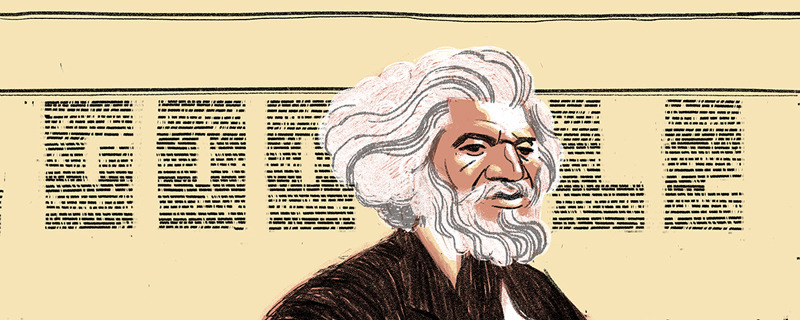Celebrating Frederick Douglass
February 1, 2016
February 1, 2016

Born Frederick Bailey in Maryland in February 1818, Frederick Douglass was the son of an enslaved woman and an unknown white father. His early life was spent on a plantation. However, when Douglass was eight years old, he was sent to Baltimore to work for the family of Hugh and Sophia Auld. In the Auld household, he learned a very valuable and life-changing lesson: education was the key to his freedom.
Sophia Auld had not owned slaves before and treated Douglass with great kindness, taught him the alphabet, and awakened his love of learning. In his autobiographies, Douglass later wrote, “The frequent hearing of my mistress reading the Bible aloud… awakened my curiosity in respect to this mystery of reading, and roused in me the desire to learn.” When Hugh Auld learned of his wife’s activities, he warned that “if you teach him how to read, he’ll want to know how to write, and this accomplished, he’ll be running away with himself.” It was a statement that burned itself into Douglass’s mind. “From that moment, I understood the direct pathway from slavery to freedom.”
Although Sophia now refused to teach him, Douglass would not be thwarted in his quest for an education. His duties in the Auld household frequently had him running errands in the city. Away from the scrutiny of his masters, he obtained a copy of Noah Webster’s spelling book and made friends with a group of white boys who gave him spelling lessons. At the age of thirteen, he made a little extra money shining boots and bought a copy of the Columbian Orator for fifty cents (just over fourteen dollars now).
This collection of political speeches, poems, and essays introduced Douglass to the ideals of the American Revolution.
At the age of fifteen, Douglass’s legal owner died and he was forced to return to plantation life. He spent the next five years assigned to several harsh masters, and endured severe hunger and beatings. After two unsuccessful attempts, he escaped from slavery in 1838 at the age of twenty and changed his name to Frederick Douglass.
Despite being at great risk of capture as a runaway slave, Douglass spoke about his experiences frequently at anti-slavery meetings. A truly gifted, eloquent, and articulate speaker, Douglass quickly became a leading figure in the abolitionist movement. He published his first autobiography, The Narrative of the Life of Frederick Douglass: an American Slave, in 1845. His fame attracted slave catchers which prompted him to leave the United States. In 1847, a group of British supporters raised money to purchase his freedom, and Douglass was able to return to the United States a free man. Upon his return, Douglass continued to advocate the abolition of slavery. He also championed equal rights for all Americans, regardless of race or gender.
Sophia Auld had not owned slaves before and treated Douglass with great kindness, taught him the alphabet, and awakened his love of learning. In his autobiographies, Douglass later wrote, “The frequent hearing of my mistress reading the Bible aloud… awakened my curiosity in respect to this mystery of reading, and roused in me the desire to learn.” When Hugh Auld learned of his wife’s activities, he warned that “if you teach him how to read, he’ll want to know how to write, and this accomplished, he’ll be running away with himself.” It was a statement that burned itself into Douglass’s mind. “From that moment, I understood the direct pathway from slavery to freedom.”
Although Sophia now refused to teach him, Douglass would not be thwarted in his quest for an education. His duties in the Auld household frequently had him running errands in the city. Away from the scrutiny of his masters, he obtained a copy of Noah Webster’s spelling book and made friends with a group of white boys who gave him spelling lessons. At the age of thirteen, he made a little extra money shining boots and bought a copy of the Columbian Orator for fifty cents (just over fourteen dollars now).
This collection of political speeches, poems, and essays introduced Douglass to the ideals of the American Revolution.
At the age of fifteen, Douglass’s legal owner died and he was forced to return to plantation life. He spent the next five years assigned to several harsh masters, and endured severe hunger and beatings. After two unsuccessful attempts, he escaped from slavery in 1838 at the age of twenty and changed his name to Frederick Douglass.
Despite being at great risk of capture as a runaway slave, Douglass spoke about his experiences frequently at anti-slavery meetings. A truly gifted, eloquent, and articulate speaker, Douglass quickly became a leading figure in the abolitionist movement. He published his first autobiography, The Narrative of the Life of Frederick Douglass: an American Slave, in 1845. His fame attracted slave catchers which prompted him to leave the United States. In 1847, a group of British supporters raised money to purchase his freedom, and Douglass was able to return to the United States a free man. Upon his return, Douglass continued to advocate the abolition of slavery. He also championed equal rights for all Americans, regardless of race or gender.
He published two additional
autobiographies, founded five newspapers, and served as the US Consul
General to Haiti.
At a time when many argued that slaves did not possess the intellectual capacity to be educated, Douglass stood as stark evidence of enslaved people’s potential. Yet despite all he accomplished in his life, Douglass was haunted by the uncertainty of something most people take for granted--the date of his birth. On March 24, 1894, Douglass wrote to Hugh Auld’s son, Benjamin, hoping to find out how old he was:
The principal thing I desired in making the inquiries I have of you was to get some idea of my exact age. I have always been troubled by the thought of having no birth day. My Mistress Lucretia Auld, said that I was eight or nearly eight when I went to Baltimore in the summer of 1825, and this corresponds with what you have heard your kind mother say on the subject. so I now judge that I am now about 77-years old.
Frederick Douglass died a year later, on February 20, 1895, not knowing the date of his birth. It was not until after his death that historians discovered Aaron Anthony’s plantation ledger recording Douglass’s birth year as 1818. The exact date is still unknown.
At a time when many argued that slaves did not possess the intellectual capacity to be educated, Douglass stood as stark evidence of enslaved people’s potential. Yet despite all he accomplished in his life, Douglass was haunted by the uncertainty of something most people take for granted--the date of his birth. On March 24, 1894, Douglass wrote to Hugh Auld’s son, Benjamin, hoping to find out how old he was:
The principal thing I desired in making the inquiries I have of you was to get some idea of my exact age. I have always been troubled by the thought of having no birth day. My Mistress Lucretia Auld, said that I was eight or nearly eight when I went to Baltimore in the summer of 1825, and this corresponds with what you have heard your kind mother say on the subject. so I now judge that I am now about 77-years old.
Frederick Douglass died a year later, on February 20, 1895, not knowing the date of his birth. It was not until after his death that historians discovered Aaron Anthony’s plantation ledger recording Douglass’s birth year as 1818. The exact date is still unknown.

An in-progress draft of
Richie's illustration showing Douglass in front of a newspaper
background that was inspired by the layout of The North Star which Douglass published from 1847 to 1851.

No comments:
Post a Comment